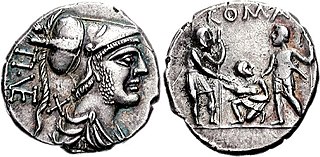Related Research Articles
Quintus Fabius Vibulanus, son of Marcus Fabius Vibulanus, was consul of the Roman Republic and one of the second set of decemviri.

Lucius Minucius Esquilinus Augurinus was a Roman politician who was consul in 458 BC and decemvir in 450 BC.

The gens Veturia, originally Vetusia, was an ancient patrician family of the Roman Republic. According to tradition, the armourer Mamurius Veturius lived in the time of Numa Pompilius, and made the sacred ancilia. The Veturii occur regularly in the Fasti Consulares of the early Republic, with Gaius Veturius Geminus Cicurinus holding the consulship in 499 BC. Like other old patrician gentes, the Veturii also developed plebeian branches. The family declined in the later Republic, with the last consular Veturius holding office in 206 BC, during the Second Punic War.
The gens Verginia or Virginia was a prominent family at ancient Rome, which from an early period was divided into patrician and plebeian branches. The gens was of great antiquity. It frequently filled the highest honors of the state during the early years of the Republic. The first of the family who obtained the consulship was Opiter Verginius Tricostus in 502 BC, the seventh year of the Republic. The plebeian members of the family were also numbered amongst the early tribunes of the people.

The gens Lucretia was a prominent family of the Roman Republic. Originally patrician, the gens later included a number of plebeian families. The Lucretii were one of the most ancient gentes, and the second wife of Numa Pompilius, the second King of Rome, was named Lucretia. The first of the Lucretii to obtain the consulship was Spurius Lucretius Tricipitinus in 509 BC, the first year of the Republic.
Lucius Furius Medullinus, of the patrician gens Furia, was a politician and general of the Roman Republic who was consul twice and Consular Tribune seven times.
GaiusVeturius Geminus Cicurinus was a Roman Republican politician during the beginning of the 5th century BC. He served as Consul of Rome in 499 BC together with Titus Aebutius Helva. He was a member of the patrician class and of the Veturia gens.
Aulus Verginius Tricostus Caeliomontanus was a Roman Republican politician and general of the gens Verginia. He served as a Roman consul in 494 BC together with Titus Veturius Geminus Cicurinus.
Titus Veturius Geminus Cicurinus was a Roman Republican patrician politician and general of the gens Veturia. He served as a Roman consul in 494 BC together with Aulus Verginius Tricostus Caeliomontanus.
Titus Quinctius Capitolinus Barbatus was a Roman statesman and general who served as consul six times. Titus Quinctius was a member of the gens Quinctia, one of the oldest patrician families in Rome.
The Roman-Aequian wars were a series of wars during the early expansion of ancient Rome in central Italy fought against the Aequi, an Italic tribe located to their east.
Lucius Aemilius Mamercus was a Roman statesman who served as consul three times: in 484, 478 and 473 BC.
Servius Sulpicius Camerinus Cornutus was a Roman politician in the 5th century BC, consul in 461 BC and decemvir in 451 BC.
Titus Veturius Geminus Cicurinus was a Roman politician of the 5th century BC, consul in 462 BC and maybe decemvir in 451 BC.
Titus Romilius Rocus Vaticanus was a Roman politician in the 5th century BC, consul in 455 BC, and decemvir in 451 BC.
Gaius Horatius Pulvillus was a Roman politician during the 5th century BC, who was consul in 477 and 457 BC.
Tiberius Aemilius Mamercus was a Roman senator active in the fifth century BC. He was consul in 470 and 467 BC.
Publius Servilius Priscus was a Roman senator active in the fifth century BC and consul in 463 BC.
Publius Lucretius Tricipitinus was a consular tribune of the Roman Republic in 419 and 417 BC.
Gaius Valerius Potitus Volusus was a consul in 410 BC and consular tribune in 415, 407 and 404 BC of the Roman Republic.
References
- ↑ Robert Maxwell Ogilvie, Commentary on Livy, books 1–5, Oxford, Clarendon Press, 1965, pp. 404, 405.
- 1 2 3 Broughton 1951 , p. 35
- 1 2 Broughton 1951 , p. 36
- ↑ Livy, Ab urbe condita, III. 8
- ↑ Broughton 1951 , pp. 35–36
- ↑ Livy, Ab urbe condita, III.10
- ↑ Dionysius of Halicarnassus, Roman Antiquities , IX. 71
- ↑ Briquel 2000 , p. 19
- ↑ Briquel 2000 , p. 193
- ↑ Broughton 1951 , p. 37
- ↑ Livy, Roman History, III.12-13
- ↑ Broughton, vol i, pp.39